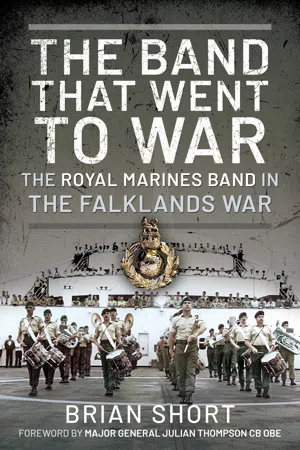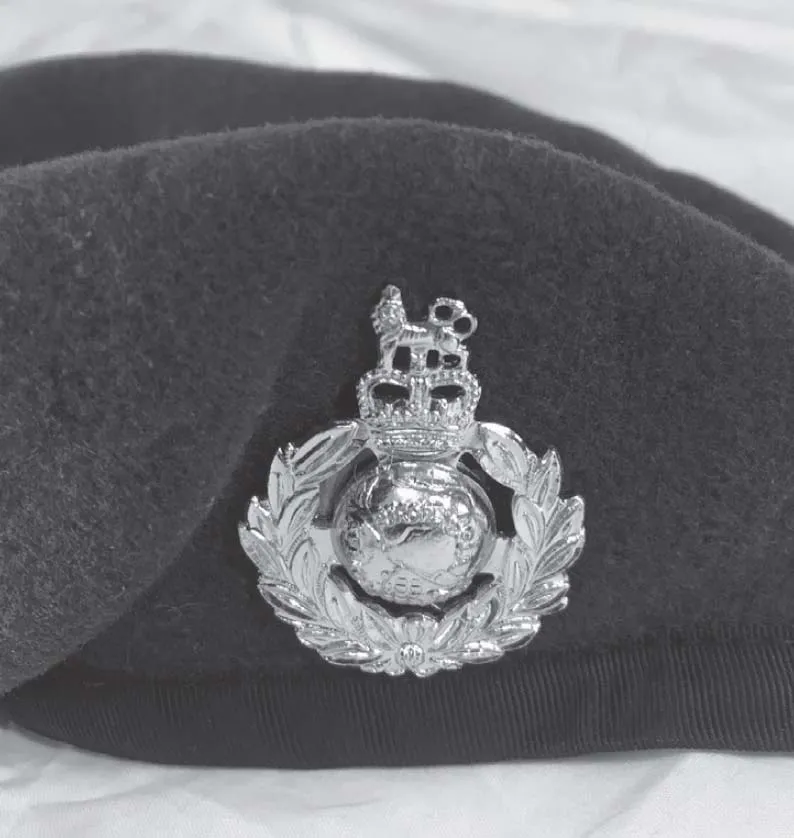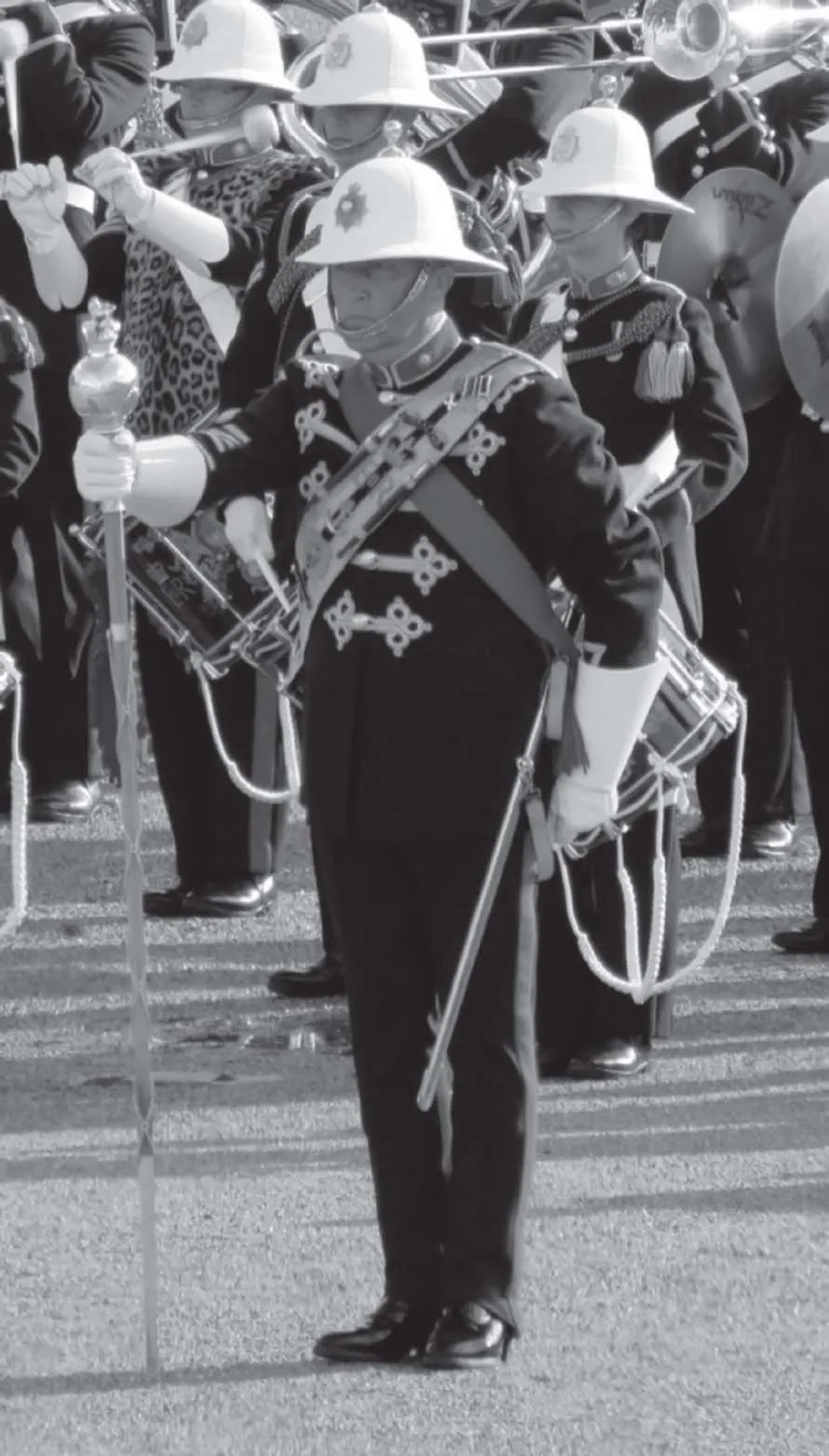![]()
Chapter One
The Band That Went To War (and Won!)
You could be forgiven for thinking that the title of this book suggests that in the spring of 1982, the Band of Her Majesty’s Royal Marines, Commando Forces Plymouth, single-handedly defeated the Argentines and removed them from the Falklands. Well yes, we were embarked on the SS Canberra for the full duration of the war and a bit beyond, but I will admit the title is firmly tongue-in-cheek. Perhaps it should more accurately be titled ‘The Band That Went To War, on the Winning Side’?
With the title explained and that acknowledgement made, I will start by paying tribute to the thousands of soldiers, sailors, airmen and of course Royal Marines who accompanied us to the South Atlantic. Between them they took care of the dirty business of war and delivered violence in the way we expect some of the best military men in the world to do. They were facing a superior in numbers [but not in quality] invading army. Their courage in removing this entrenched enemy, who had invaded British soil and made captives of its lawful inhabitants, deserves the highest recognition. It is also very important to remember that many of them made the ultimate sacrifice, and that should not be in any way forgotten or undermined by the rather light tone of this book. When the names of the fallen appear in this book, do more than just read their names: take a moment to reflect that just like you, these were real people with lives, hopes, careers and families, all of which were impacted by the failure of diplomacy.
How then would a band of professional musicians have contributed in any way to a war, you might reasonably well ask? Well, after accepting that the band could not have done it alone, this book aims to give an insight into some of the many roles, responsibilities and duties undertaken by the Royal Marines musicians during the Falklands war. You will notice the use of the word war and not conflict or crisis, or any word that suggests it was anything other than war. There are official definitions of a war and no doubt in some Whitehall office or for some pedantic armchair warriors the Falklands does not officially count as one, but it was warlike enough for me, thank you very much, and since a lot of people were killed or wounded in the fighting, as far as I am concerned it was war, okay!
This book itself is not meant to be a comprehensive chronological diary of the Falklands War but is written from my Swiss cheese of a memory, first-hand accounts of some of the band members and my own contemporaneous hand-scribbled diary. As the author, it will of course draw heavily on my own experiences, diary and memories, but I am grateful to those that served in the band at the time and who also wanted to contribute. I hope they and all members of Commando Forces Band feel their own war experience is somehow reflected in some small way. There are a lot of people I have to thank, in particular Major General Julian Thompson and Lieutenant Colonel John Ware for their wonderfully written Foreword and Introduction to the book. For their personal contributions: Bryan Walker, Irfron Higgins, Jorge Podesta, Tony Richardson, Paul Coker, Martin Dale and James ‘Wiggy’ Whitwham. Also Gary Pumford, Andrew Dusty Miller, Mac Mcarthy, Geoff Naylor, Paul Foley, Phil Smith, Buster Brown and Derrick Douglas for their suggestions and jogging my ailing memory. Sincere thanks to Commander John Muxworthy RN [retired] and his wife Angela for the wonderful quote and photographs from his book The Great White Whale Goes to War. Warm thanks to Alyson Attwood for releasing her late husband WO2 Trevor Attwood’s diaries for reference and to John Pring for his photographic advice. Susie Cox at P&O Heritage for her kind assistance. Finally, I also need to give credit to the late Band Sergeant Russ Ireland for the use of some of his photographs. Russ unfortunately passed away a few years ago while I was still researching the book, but his help and support was invaluable. Luckily, before his passing Russ had the foresight to share his photographic slides with John Ware. Time, dust and scratches have taken their toll, but where usable they have been included as part of the important band record of that time in 1982 when musicians were called to war.
My apologies to any of the band who do not feature during the narrative; this is only because I had not written about you in my diary at the time or have not been passed on such memories by other contributors. Anyone not named specifically can take solace in their name appearing in the nominal roll at the end of the book. Talking of memories, this book is being written some thirty-nine years after the event. It is written by a man who forgets what he went out to the garage for and what he had for dinner yesterday. Therefore, there will be mistakes, gross errors and serious omissions, for all of which I accept responsibility as mine and mine alone.
At this point a caveat worth noting is that for a book about a war there might just not be enough ‘war’ in it for the casual reader who is looking for a blow-by-blow account of fighting and heroic acts. This is not a war book per se, but a book about a specific group of people in a war, namely musicians who up until this point in their careers had practised and produced music to entertain people. I hope that this attempt to tell their story from an entirely different perspective, one that has not been explored before, will satisfy the informed military enthusiast, the interested musician, or maybe the casual reader. There are plenty of Falklands War books out there, but my account is a personal one of being a professional musician in a war with a pretty good band of guys. I hope you enjoy it.
The Band of HM Royal Marines, Commando Forces, Plymouth, doing what they do best.
As luck or perhaps good planning would have it, when we were ‘asked’ to attend the war, we took with us the roughest, toughest gang on planet Earth, the Royal Marine Commandos. If this sounds a little parochial and insular, or to use a well-known Royal Marine phrase ‘Corps Pissed’, then I make no apology, as the Royal Marines hammer that into the individual regardless of whether you are a Commando or a bandy (as RM musicians are affectionately known). When you see how the Marines are trained at the Commando Training Centre in Lympstone and work with them throughout the Corps, you are left in no doubt as to their professional ability when it comes to fitness, endurance and committing violence against our enemies. So, like taking your big brother to school to sort out a bully, the Marines were definitely our first choice to take to a war (other cap badges are available).
The much-coveted Green Beret of the Royal Marines: the Globe & Laurel cap badge reflecting the many battle honours the Corps has earned around the world in its long history since 1664.
No matter how ‘Corps Pissed’ I happen to be, however, I do acknowledge the professionalism and skill sets of other branches of the armed forces that took part and who were of course invaluable to the success of the mission: the Royal Navy, the army (in particular the Parachute Regiment) who joined the Marines of 3rd Commando Brigade under Brigadier Julian Thompson RM. Also the regiments that arrived in theatre aboard the QE2 that made up 5th Brigade and also made their mark on the enemy in well-documented and fierce battles. There was of course Royal Air Force involvement with Rapier missile squadrons deployed on the ground, RAF pilots flying Harriers from the carriers and the famous ‘Blackbuck’ Vulcan bombing and Shrike anti-radar missions, all of which are more than worthy of just a footnote. As one of the smaller but complete units, most of the work undertaken by the Commando Forces Band was in supporting the Red, Green, Blue and various Brown Berets, leaving them to do what they are good at: committing acts of gross violence against a common enemy. I like to think of us as the oil, helping to keep the war wheels turning and contributing to the overall success of the mission.
Even among our relatively simple duties, there were some moments of danger, courage and of course humour, which I hope will combine to provide an interesting read in this book. If you make it to the end, I hope you will see that the band did their very best in a bad situation, getting stuck in and their hands dirty in more ways than one. Perhaps some of the grittier details may surprise you and cause you to view those talented smart musicians in a different light when you next see them marching on Horse Guards Parade, the Royal Albert Hall or at a royal wedding. They are today – and we were then – professionals, with a thinking skill set that goes well beyond marching and music, and occasionally across the blurred border into the military skill set when required. Royal Marine musicians know the dangerous end of a gun, but does the Royal Marine Commando know the dangerous end of a bass trombone?
Corps Drum Major James ‘Wiggy’ Whitwham proudly leads the massed bands of HM Royal Marines on Horse Guards Parade during one of the many high profile spectacular beating retreat ceremonies.
It is also worth pointing out that the Commando Forces Band’s Falklands War experience is not a unique one for Royal Marine musicians. During the Falklands War there was also a small band on the hospital ship Uganda and a solo bugler on HMS Antrim, all providing largely unseen but important active service. The Royal Marine Band Service (RMBS) has a long and proud history of taking part in conflicts in their secondary military role in times of war or conflict, for which they still undertake regular and intensive military training. Not exactly loved by musicians, military training weeks are seen as a necessity rather than an enjoyable experience, but time and time again the training has been shown to be useful and effective. No one joins the Royal Marine Band Service wanting or expecting to go to war, but history and experience show that you really ought to be prepared, which through training and that Globe & Laurel cap badge ethos we were, and they still are today.
Our going to war was not a first for Royal Marine Band Service members. During the Second World War many capital ships had small RM ships’ bands embarked. As well as their musical duties, their action stations were often in gun-plotting compartments or deep down in the magazines sending up heavy ammunition. The nature of these roles meant that their action stations were below decks beneath many locked-down watertight hatches, which if the ship was hit or torpedoed caused a great many of them to be lost when those ships went down. Their loss is worth much more than a few lines in this book, but that would need someone with more talent and research to tell their story and do credit to their sacrifice.
In more recent times, if you see any Royal Marine Band on a parade or concert, you will see that they sport an impressive collection of medals from modern-day conflicts, hard-earned in the likes of Iraq and Afghanistan. One of their recent operational deployments involved them in their medical role helping to combat the Ebola crisis in Africa and medical deployments in support of the Royal Navy. As I write this in February 2021, some of them are working in support of the NHS in hospitals dealing with the Covid-19 crisis. As a result of being deployed into the hospitals, at least one of them caught the virus in doing their duty, so even though they may not have played music as much in that year, the band service is still providing a useful service and the taxpayer still getting their money’s worth.
A musician is not just for Christmas, music or war. Here David Thornber, a former Royal Marine musician himself, was both surprised and delighted to be given a vaccination by two serving members of the RMBS during the Covid-19 epidemic of 2021.
In closing this chapter, the modern Royal Marine Band Service in 2021 is much smaller than when I served, but if anything, they have increased on the high professional and musical standards that I enjoyed, and yet still provide an essential military role when required. If I am not preaching to the converted, then go and check them out at your earliest convenience and you will be impressed. Note to politicians: yes, they are great entertainers and musicians, but in the turmoil of world politics, you never know when you might need them for a more supportive or military role.
The Royal Marine Band playing at the Royal Albert Hall during one of their many Mountbatten Festival concerts.
![]()
Chapter Two
It’s Not All About Me, But...
Having bought, borrowed or stolen this book, to get the most from it I suggest you need to understand something about me, my background, my style of writing and my deeply warped sense of humour. In short, you need to know why I wrote the book and to understand a little about me. I have not just casually clambered aboard the ‘write a book, sell a book’ bandwagon for the Falklands’ fortieth anniversary; I have written this book because I feel it is a story that needs telling, and since no one else has stepped forward it may as well be me before it is too late and the story is lost. Another important prompt for writing has been that in recent years I seem to be attending more funerals than weddings, and slowly moving up that unwanted ‘promotion’ ladder myself. Looking through the band nominal roll at the end of the book, there are already a good number of names who sadly are no longer with us, so yet another reason for me to commit our story to paper.
One year in the writing, five years in the remembering and thirty-eight years in the forgetting, I hope it does justice to the band’s war efforts. It is published in time for the fortieth anniversary, but who among us will be around for the fiftieth? So, having put my head above the parapet and committed an inordinate amount of time to this project, I will say that this chapter is not just an excuse to write about myself, but hopefully over the next few paragraphs the actual purpose will become clear and some of the associated detail of added interest to the reader. If you disagree, then take the book back to the charity shop and claim your pennies back.
To start with, it might not be quite so unusual for me to be the second member of my family to serve...









